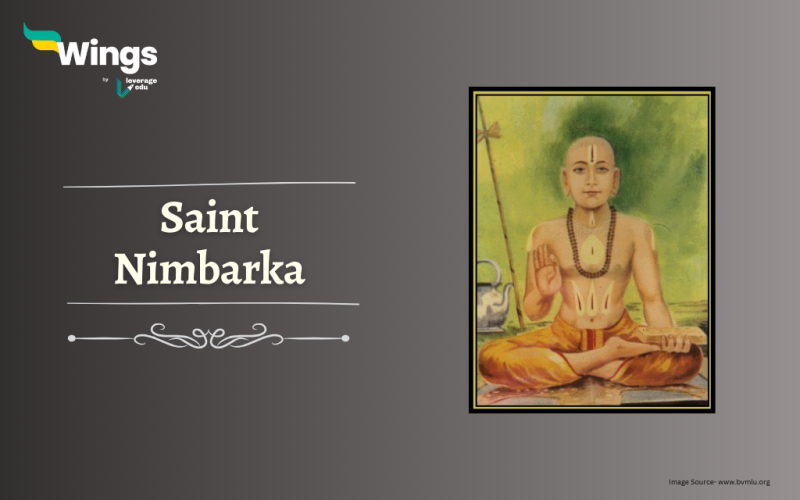Nimbarka is also known as Nimbaditya or Niyamananda. He was a philosopher, theologian and religious leader in Hinduism. He lived during the 13th century and was the founder of the Nimbarka Sampradaya, one of the major Vaishnava sects in India. Nimbaraka was the propounder of Vaishnava Bheda-Abheda, the theology of Davitadvaita or dualistic non-dualism. Today, we dive into the life and works of this exceptional philosopher Nimbarka and his contribution to the culture of India.
Table of Contents

Early Life of Nimbarka
Nimbaraka is believed to have lived 12th and 13th CE centuries, but some suggest that he lived in the 6th and 7th century CE.
- He is believed to be born in the village of Bellary, in present-day Karnataka, India.
- Not much is known about the early life of Nimbarka but, it is believed that he demonstrated great intellectual capabilities and a deep inclination towards spirituality.
- He moved to Mathura, Uttar Pradesh and studied various philosophical systems and spent several years delving deep into the Vedas and Upanishads.
Also Read – Goswami Tulsidas: Life, Works and Ramacharitmanas
The Teachings and Philosophy of Nimbarka
Nimbarka’s philosophy was centred around the idea of “Dvaitadvaita” or “dual non-dualism.”
- According to this philosophy, the Supreme Reality, called “Brahman,” is both separate and non-separate from the individual soul.
- He believed that the individual soul must cultivate a loving and selfless relationship with the Supreme Reality in order to attain liberation.
- Nimbarka emphasized the importance of devotion (Bhakti) as the most direct path to realizing the divine.
- Nimbaraka’s teachings were conceptualised as Swayam Bhagavan or “One is also the Orignal Personality of God”.
- He regarded the soul and matter as powers or parts of the Ultimate Reality i.e. God.
- In his teachings, he also proposed 5 ways to attain Moksha (Salvation). They were – Karma, Vidya, Parpatti, Dhyana and Gurupasatti.
- He was a contemporary of Shri Ramanujacharya
Also Read – Saint Kabir Das: A Short Note with Dohe
Contributions of Nimbarka
Nimbarka’s greatest contribution to Hindu philosophy was the establishment of the Nimbarka Sampradaya.
- This lineage has a significant following and continues to propagate his teachings to this day.
- He wrote several important texts, including the “Nimbarka Bhasya,” which expounded on his philosophical ideas.
- He wrote Vedanta-Parijata-Saurabha, which was a commentary on Brahma Sutras
- His teachings have been based on some of the concepts of Bhakti – Yoga, the path of devotion to God for god the ecstatic love.
- Nimbarka also contributed to the development of Bhakti poetry and song in North India, inspiring many devotees to express their love and devotion through art and music.
- He believed that the ultimate reality is both Saguna and Nirguna.
- For him, the Bhakti or the path of Devotion is the path of Liberation.
Most of the publications were burned during the reign of Mughal Emperor Aurangzeb. Hence, there lies little information about this great personality.

Nimbarka’s Influence and Legacy
Nimbarka’s philosophy had a deep impact on Vaishnavism and Bhakti traditions in India. His teachings and sampradaya continue to inspire and guide millions of devotees across the world. The Nimbarka Sampradaya has numerous temples and ashrams dedicated to its practices, preserving and spreading Nimbarka’s legacy.
In conclusion, Nimbarka’s life and works have impacted the thought process of scholars, philosophers, and spiritual seekers throughout the centuries. His wisdom and new approach to the Vedanta Philosophies continue to guide those seeking answers to the existential questions of life.
Relevant Blogs
| Difference Between Nayanars and Alvars | Adi Shankaracharya |
| Chaitanya Mahaprabhu | Sufi Movement |
| Vedanta Philosophy | Main Branches of Philosophy |
| Difference Between Ramayana and Ramcharitmanas | Gautam Buddha |
That’s all about Saint Nimbarka! If you want to know more about topics like this, then visit our general knowledge page! Alternatively, you can also read our blog on general knowledge for competitive exams!
 One app for all your study abroad needs
One app for all your study abroad needs













